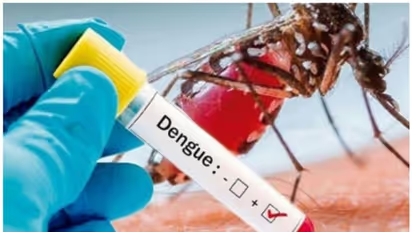Dengue: 10 ways to prevent mosquito activity during summers

Synopsis
Staying informed about dengue outbreaks and getting medical assistance if symptoms occur can dramatically lower the chance of contracting dengue fever throughout the summer months.
Preventing dengue infection during summer primarily involves minimizing mosquito exposure and reducing mosquito breeding sites. Keeping surroundings clean and supporting community clean-up efforts further decreases mosquito populations. Installing window screens and staying indoors during peak mosquito activity times also contribute to prevention.
By staying informed about dengue outbreaks and seeking medical attention if symptoms arise, individuals can significantly reduce the risk of contracting dengue fever during the summer months
Here are some effective measures:
1. Use Mosquito Repellent: Apply mosquito repellent containing DEET, picaridin, or lemon eucalyptus oil to exposed skin and clothing, especially during the daytime when dengue mosquitoes are active.
2. Wear Protective Clothing: To reduce skin exposure to mosquitoes, wear long-sleeved shirts, long pants, socks, and closed shoes.
3. Use Mosquito Nets: Use mosquito nets while sleeping, particularly for infants and young children, or if you're in an area with high mosquito activity.
4. Avoid Peak Mosquito Activity Times: Dengue mosquitoes (Aedes aegypti) are most active during dawn and dusk. Stay indoors during these times, or take extra precautions if you need to be outside.
5. Eliminate Breeding Sites: Regularly check your surroundings for stagnant water where mosquitoes breed. Empty, cover, or treat any containers, such as flower pots, buckets, or old tires, that can collect water.
6. Keep Surroundings Clean: Dispose of garbage and eliminate clutter around your home. Dengue mosquitoes can breed in even small amounts of standing water.
7. Use Window Screens: Install and maintain screens on windows and doors to prevent mosquitoes from entering your home.
8. Support Community Efforts: Participate in community clean-up activities and support local mosquito control efforts, such as fogging or larviciding programs.
9. Travel Precautions: If you're travelling to an area with a high risk of dengue, take extra precautions. Stay in accommodations with air conditioning or screened windows, and use mosquito nets if needed.
10. Stay Informed: Stay updated on dengue outbreaks and take necessary precautions.
Remember, while these measures can greatly reduce the risk of dengue infection, it's essential to remain vigilant, especially during peak mosquito season. If you experience symptoms like high fever, severe headache, pain behind the eyes, joint and muscle pain, rash, and mild bleeding (such as nose or gum bleed), seek medical attention immediately, as these could be signs of dengue fever.
-Dr. Suresh Gowda, Consultant - Paediatrician and Neonatologist, Motherhood Hospitals, HRBR Layout, Bangalore
Explore the latest Lifestyle News covering fashion, wellness, travel, Food and Recipes, and more. Stay updated with trending Health News, fitness tips, and expert insights to inspire your daily living. Discover personalized lifestyle trends that keep you stylish and informed. Download the Asianet News Official App from the Android Play Store and iPhone App Store for everything that adds value to your everyday life.